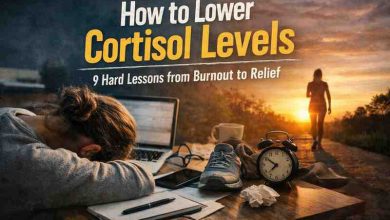
When it comes to what causes blindness, many peope are left confused and worried. But this comprehensive guide is here to shine a light on the many factors that can affect your eye health and show you that even when faced with vision loss, there are plenty of opportunities for hope and improvement. In this article, we’ll explore 10 incredible reasons and causes behind blindness, including diabetic retinopathy, glaucoma, cataracts, and more. We’ll also provide actionable advice, useful resources, and plenty of tips to help you stay informed and proactive about preserving your vision. So, lets dive in and learn why understanding what causes blindness can be a powerful step towards a brighter future for your eyes!

1. Diabetic Retinopathy: When Sugar Hurts Your Eyes
Diabetic retinopathy is one of the leading causes of blindness worldwid. People with diabetes may experience damage to the blood vessels in the retina, which over time can lead to vision loss. This condition is often gradual, and its symptoms might be overlooked until serious damage has occured.
Key points:
- Diabetes and vision: High blood sugar levels can cause the small blood vessels in the retina to leak or become blocked.
- Prevention and management: Managing your blood sugar, blood pressure, and cholesterol can help prevent or slow the progress of diabetic retinopathy.
- Early detection: Regular eye exams are essential for those with diabetes. Early detection can save your sight!
For more detailed information, check out this insightful article on the American Academy of Ophthalmology website which dives deep into the impact of diabetes on eye health.
2. Glaucoma: The Sneaky Thief of Sight
Glaucoma is often called the “sneaky thief of sight” because it can gradually steal your vision without any early warning signs. This group of eye diseases typically results in increased pressure in the eye, leading to damage of the optic nerve.
Important facts:
- Types of glaucoma: There are several types, including open-angle and angle-closure glaucoma. Each type requires different treatment approaches.
- Risk factors: Age, family history, and ethnic background (especially in African American and Hispanic populations) can increase the risk.
- Treatment options: Medications, laser treatment, and surgery can help control the disease and prevent further damage.
To learn more about glaucoma and its treatment, you can visit the National Eye Institute which provides a wealth of reliable resources.
3. Cataracts: Cloudy Vision But Not Hopeless
Cataracts occur when the natural lens of the eye becomes cloudy, leading to blurred vision. This condition is common among older adults and is one of the most curable causes of vision loss.
Highlights:
- Causes: Aging, prolonged exposure to UV light, smoking, and certain medications can contribute to the development of cataracts.
- Symptoms: Blurry vision, difficulty with glare, and faded colors.
- Treatment: Surgery is highly effective in removing cataracts, and most patients see a significant improvement in their vision post-surgery.
For further reading, check out this article on WHO’s website that discusses cataracts and global eye health issues.
4. Age-Related Macular Degeneration (AMD): Protecting Your Central Vision
Age-related macular degeneration, or AMD, affects the central part of your retina (the macula) which is essential for sharp, detailed vision needed for activities like reading and driving. AMD is a major cause of blindness among older people.
Main considerations:
- Types: There are two main types of AMD – dry and wet. The dry form is more common and progresses slowly, while the wet form is less common but can lead to rapid vision loss.
- Risk factors: Genetics, smoking, and poor diet are known risk factors.
- Prevention: Maintaining a diet rich in leafy greens, fish, and antioxidants, along with regular eye check-ups, can help delay the onset or progression of AMD.
Discover more about AMD and steps you can take to protect your vision in this detailed article on AMD prevention.
5. Retinal Detachment: An Urgent Medical Emergency
Retinal detachment is a serious condition where the retina peels away from its underlying layer of support tissue. If not treated immediately, this condition can lead to permanent blindness.
Critical aspects:
- Warning signs: Sudden appearance of floaters, flashes of light, or a shadow/curtain over part of your vision.
- Causes: Trauma, severe myopia (nearsightedness), and previous eye surgeries can increase the risk.
- Treatment: Prompt surgical intervention is necessary to reattach the retina and prevent permanent damage.
For a more comprehensive understanding, you can refer to expert advice on retinal detachment available at the American Academy of Ophthalmology.
6. Infections and Inflammations: When Your Eyes Fight Back
Infections such as endophthalmitis or inflammations like uveitis can also be a cause of blindness if not treated properly. These conditions can lead to damage of the eye’s delicate structures and can result from injuries, surgeries, or systemic diseases.
Take aways:
- Infections: Bacterial, viral, or fungal infections can cause severe inflammation in the eye.
- Prevention: Good hygiene and prompt treatment of any eye injury can prevent infections.
- Treatment: Often involves antibiotics or anti-inflammatory medications, and in severe cases, surgery may be necessary.
For further details on preventing eye infections, see this informative article on eye care.
7. Genetic Disorders: The Role of Inherited Conditions
Genetic conditions can play a significant role in what causes blindness. Diseases like retinitis pigmentosa and Leber congenital amaurosis are inherited disorders that lead to progressive vision loss.
Key insights:
- Retinitis pigmentosa: A group of genetic disorders that cause the breakdown and loss of cells in the retina over time.
- Leber congenital amaurosis: A rare inherited eye disease that causes severe vision loss at birth.
- Advances in treatment: Recent research and gene therapy trials are providing new hope for individuals with these conditions.
To get a deeper insight into genetic causes of blindness, consider reading research updates on the National Eye Institute.
8. Trauma and Injuries: When Accidents Impact Your Vision
Accidents that lead to injuries of the eye or head can result in blindness if the damage is severe enough. Trauma-induced blindness may be due to physical injuries, chemical exposure, or even radiation.
Important points:
- Immediate action: In case of an eye injury, seeking immediate medical attention is crucial.
- Types of trauma: Blunt force trauma, penetrating injuries, or exposure to harmful chemicals can all affect your vision.
- Prevention: Wearing protective eyewear in high-risk situations (like sports or industrial work) can reduce the risk of traumatic eye injuries.
Learn more about preventing eye injuries and the importance of safety gear from this helpful safety and health resource.
9. Nutritional Deficiencies: Feeding Your Eyes the Right Way
Your eye health is directly related to your overall nutrition. A deficiency in key nutrients such as vitamin A, omega-3 fatty acids, and antioxidants can lead to vision problems and even blindness.
Nutritional must-knows:
- Vitamin A deficiency: This is one of the most common causes of preventable blindness in children in developing countries.
- Omega-3 fatty acids: Found in fish, these are essential for maintaining the health of the retina.
- Antioxidants: Nutrients like vitamin C and E help protect your eyes from oxidative stress and damage.
For more nutritional tips to protect your vision, visit Harvard Health Publishing for articles on vitamins and eye health.
10. Environmental Factors and Lifestyle Choices: The Impact of Daily Habits
Our daily habits and the environment we live in can have a big impact on what causes blindness. Factors such as prolonged exposure to UV light, smoking, and even excessive screen time can affect your vision over time.
Consider these lifestyle tips:
- UV Protection: Wearing sunglasses that block UV rays can help protect your eyes from cataracts and macular degeneration.
- Smoking cessation: Smoking has been linked to an increased risk of AMD and cataracts.
- Screen breaks: Following the 20-20-20 rule (every 20 minutes, look at something 20 feet away for 20 seconds) can reduce eye strain from prolonged digital device use.
- Regular exercise: A healthy lifestyle improves circulation, which in turn supports overall eye health.
Check out this comprehensive guide on lifestyle and eye health for more actionable advice.
Why Understanding what causes blindness Matters
Learning about what causes blindness is not just for those who are at risk—it’s for everyone who cares about maintaining optimal eye health. Knowing the factors that contribute to vision loss can empower you to take proactive steps in your daily life. Whether it’s managing a chronic condition like diabetes, protecting your eyes from environmental hazards, or simply eating a nutrient-rich diet, every small change can add up to a big difference in preserving your sight.
By being informed, you can:
- Recognize early symptoms: Early detection through routine eye exams is key. Don’t wait until it’s too late!
- Adopt a healthier lifestyle: Small changes such as quitting smoking, using proper eye protection, and eating a balanced diet can have a major impact.
- Advocate for better healthcare: Understanding these risks helps you communicate better with healthcare providers and seek timely treatment.
It’s important to remember that even if you are diagnosed with a condition that affects your vision, advancements in treatment and technology continue to improve outcomes. New therapies, surgical techniques, and medications are being developed all the time to help restore and protect vision.
Actionable Steps To Protect Your Vision
Here are some actionable tips that you can implement right away to support your eye health:
- Schedule Regular Eye Exams
Even if you feel that your vision is fine, regular eye exams can detect problems before they become severe. Early diagnosis is critical for effective treatment. - Manage Chronic Conditions
If you have diabetes, high blood pressure, or high cholesterol, work closely with your healthcare provider to manage these conditions. This can significantly reduce the risk of what causes blindness. - Protect Your Eyes From UV Light
Invest in high-quality sunglasses that block out 99% to 100% of UV rays. This simple step can help reduce the risk of cataracts and AMD. - Follow a Nutritious Diet
Incorporate foods rich in vitamins A, C, and E, along with omega-3 fatty acids, into your diet. Leafy greens, fish, and colorful fruits can do wonders for your eye health. - Quit Smoking
Smoking has been linked to several eye conditions, including glaucoma and AMD. Quitting smoking is one of the best things you can do for your overall health and vision. - Wear Protective Eyewear
Whether you’re playing sports, working in hazardous environments, or even spending long hours in front of a screen, protective eyewear can prevent injuries and reduce eye strain. - Stay Informed and Educated
Keep up-to-date with the latest research and advancements in eye care. Websites like the American Academy of Ophthalmology and National Eye Institute offer reliable and current information.
The Future of Eye Care and Research
The field of eye care is constantly evolving, with researchers around the globe working tirelessly to understand what causes blindness and to develop innovative treatments. From groundbreaking gene therapies to advanced surgical techniques, the future of vision care is looking brighter than ever.
Emerging trends include:
- Gene Therapy: New treatments that target genetic causes of blindness are showing promising results. These therapies aim to correct the underlying genetic defects that lead to conditions like retinitis pigmentosa.
- Stem Cell Research: Scientists are exploring the potential of stem cells to regenerate damaged retinal tissue, which could revolutionize the treatment of various eye diseases.
- Advanced Imaging Techniques: Modern imaging technologies allow doctors to see the retina in greater detail than ever before. This enables early diagnosis and more precise treatment plans.
- Artificial Intelligence: AI is beginning to play a significant role in diagnosing and predicting eye diseases. Algorithms can now analyze retinal images to detect subtle changes that might indicate the early onset of conditions like glaucoma or AMD.
These advances not only promise better outcomes for patients but also inspire hope for those who are at risk of losing their sight. Stay tuned to reputable sources such as Harvard Health Publishing and WHO for the latest updates in eye research and treatments.
Common Misconceptions About What Causes Blindness
There are many myths and misunderstandings surrounding what causes blindness, which can lead to unnecessary fear and confusion. Here are some common misconceptions debunked:
- Myth 1: Only the elderly are affected.
While age is a risk factor, many conditions that cause blindness, like trauma or infections, can affect people of all ages. - Myth 2: Vision loss is always permanent.
Not all forms of vision loss are irreversible. With early detection and proper treatment, conditions like cataracts can be effectively managed or even cured. - Myth 3: Blurry vision is normal with aging.
While minor changes in vision can occur with age, significant vision changes should always be evaluated by an eye care professional. - Myth 4: If you’re not at risk, you don’t need regular eye exams.
Regular eye exams are important for everyone. They not only detect what causes blindness but also help identify other health issues that may be related to eye health.
By busting these myths, we hope to encourage a more informed and proactive approach to eye care.
Real Life Stories: Overcoming Vision Challenges
Hearing real life stories of individuals who have faced and overcome vision challenges can be truly inspiring. Many people who were once diagnosed with conditions that fall under what causes blindness have managed to regain significant portions of their vision, or have learned to adapt and thrive despite their limitations.
For instance, one patient recounted how early detection of diabetic retinopathy and subsequent laser treatments saved his sight. He emphasizes that regular check-ups and proper management of his diabetes were the keys to preventing total vision loss. Stories like these remind us that timely intervention can make all the difference.
Another inspiring story comes from someone who experienced retinal detachment after a sports injury. Despite the initial shock and fear, prompt surgical intervention and follow-up care allowed them to recover most of their vision. These accounts provide hope and underscore the importance of not ignoring any changes in your vision.
Tips for Living with Vision Loss
For those who have experienced partial vision loss, adapting to a new normal can be challenging but not impossible. Here are some tips to help you maintain a good quality of life and continue enjoying everyday activities:
- Stay Positive and Informed:
Knowledge is power. Understand your condition, learn about the treatment options available, and connect with others who share similar experiences. - Use Assistive Technologies:
Devices like screen readers, magnifying glasses, and specialized software can help you navigate daily tasks. Many innovative technologies are designed to help individuals with vision loss lead independent lives. - Join Support Groups:
There are many online and local communities where you can find support, share your experiences, and get practical advice from others who understand what you’re going through. - Keep Regular Contact with Your Doctor:
Regular follow-ups with your eye care provider can help monitor your condition and catch any changes early. - Adapt Your Home Environment:
Simple changes, such as better lighting, high-contrast markings on appliances, and decluttering, can make your home safer and easier to navigate.
For additional resources on living with vision loss, you can explore VisionAware which offers a range of helpful tools and advice.
Final Thoughts: Empowering Yourself Against What Causes Blindness
Understanding what causes blindness is a crucial step in protecting your vision. Whether you are at risk or simply want to maintain your eye health, being informed about the various causes and prevention strategies is empowering. This guide aimed to break down complex topics into clear, understandable information so that you can take positive actions towards safeguarding your sight.
Remember that many conditions leading to vision loss are manageable if caught early, and that modern advancements in medicine continue to offer new hope. Even if you have already faced challenges with your vision, know that support, treatment, and a proactive approach can help you lead a fulfilling life.
This article is optimized with tips from Rank Maths Content AI and is designed to be both engaging and informative. We hope that you find this guide helpful and that it encourages you to take the necessary steps to protect your vision every day. If you enjoyed this article, please share it with friends and family to spread awareness about the importance of eye care.
Recap of the 10 Key Points
- Diabetic Retinopathy: Manage your blood sugar to prevent damage.
- Glaucoma: Regular eye exams can help catch this stealthy condition early.
- Cataracts: A common and treatable cause of cloudy vision.
- AMD: Protect your central vision with proper nutrition and lifestyle.
- Retinal Detachment: Quick response is vital for saving sight.
- Infections and Inflammations: Prompt treatment can prevent serious damage.
- Genetic Disorders: Advances in gene therapy are offering new hope.
- Trauma and Injuries: Wear protective gear to prevent accidents.
- Nutritional Deficiencies: A balanced diet supports strong eye health.
- Environmental & Lifestyle Factors: Daily habits significantly impact your vision.
Final Note
It’s realy important to keep in mind that while this article covers many aspects of what causes blindness, it’s always best to consult with an eye care professional for personalized advice. Your eyes are a precious part of your overall health, and taking simple, proactive steps can help you maintain your vision for years to come.
For further reading on eye health topics, you might also check out this informative piece on Eye Health Topics and explore a wide range of articles that discuss various conditions and their treatments.
We hope this guide has helped you understand the various factors behind what causes blindness and has provided you with practical steps to protect your vision. Remember, every small effort counts, and a proactive approach towards eye health can make a big difference in your life. Stay informed, take action, and keep your eyes on a bright future—even if things get a bit blurry along the way!



